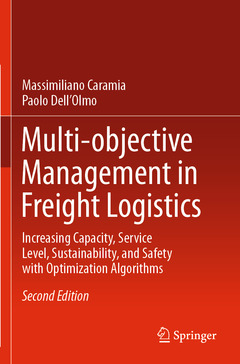Description
Multi-objective Management in Freight Logistics (2nd Ed., 2nd ed. 2020)
Increasing Capacity, Service Level, Sustainability, and Safety with Optimization Algorithms
Authors: Caramia Massimiliano, Dell’Olmo Paolo
Language: English
Subject for Multi-objective Management in Freight Logistics:
Approximative price 168.79 €
In Print (Delivery period: 15 days).
Add to cartPublication date: 08-2021
196 p. · 15.5x23.5 cm · Paperback
Approximative price 168.79 €
In Print (Delivery period: 15 days).
Add to cartPublication date: 07-2020
196 p. · 15.5x23.5 cm · Hardback
Description
/li>Biography
/li>Comment
/li>
The second edition of Multi-Objective Management in Freight Logistics builds upon the first, providing a detailed study of freight transportation systems, with a specific focus on multi-objective modelling. It offers decision-makers methods and tools for implementing multi-objective optimisation models in logistics. The second edition also includes brand-new chapters on green supply chain and hybrid fleet management problems.
After presenting the general framework and multi-objective optimization, the book analyses green logistic focusing on two main aspects: green corridors and network design; next, it studies logistic issues in a maritime terminal and route planning in the context of hazardous material transportation. Finally, heterogeneous fleets distribution and coordination models are discussed.
Massimiliano Caramia is Full Professor in Operations Research at the Department of Enterprise Engineering, Università di Roma "Tor Vergata", Italy.
Paolo Dell'Olmo is Full Professor in Operations Research at the Department of Statistics, Sapienza Università di Roma, Italy.
Presents a comprehensive overview of freight transportation systems and multi-objective modelling
Expands on the previous edition with new chapters on waste collection and hybrid fleet management
Offers both mathematical and tactical perspectives on the problems discussed



